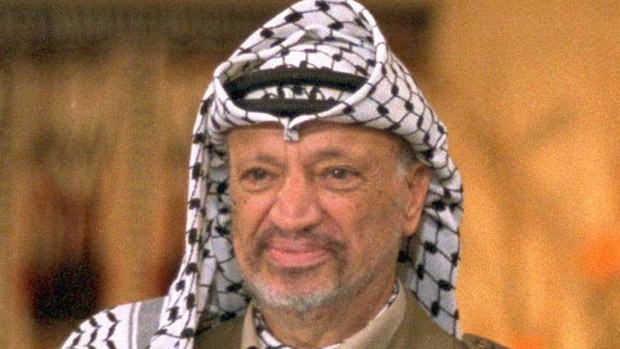Nobel Peace Prize: the five most controversial winners
If Vladimir Putin collects award today he'll be the latest in a long line of questionable winners

A free daily email with the biggest news stories of the day – and the best features from TheWeek.com
You are now subscribed
Your newsletter sign-up was successful
UPDATE: Since this story was published it has been announced that the Organisation for the Prohibition of Chemical Weapons (OPCW) has won the 2013 Nobel Peace Prize.
IF VLADIMIR PUTIN wins the Nobel Peace today the decision will be hugely controversial. Then again, the $1.2m award - first handed out on 10 December, 1901 - is no stranger to controversy.
The Russian president has been nominated by an advocacy group for his efforts to "maintain peace and tranquillity". The citation makes specific reference to Putin's efforts to dissuade the US from launching an attack on Syria in the aftermath of the 21 August chemical weapons attack on the Damascus suburbs.
The Week
Escape your echo chamber. Get the facts behind the news, plus analysis from multiple perspectives.

Sign up for The Week's Free Newsletters
From our morning news briefing to a weekly Good News Newsletter, get the best of The Week delivered directly to your inbox.
From our morning news briefing to a weekly Good News Newsletter, get the best of The Week delivered directly to your inbox.
Critics of the Russian president are incredulous. They point out that the former KGB colonel has armed and aided the Bashar al-Assad Assad regime, says The Independent. They ask how the architect of a "ruthless and violent campaign" against separatists in Chechnya and Georgia, could possibly be considered as a candidate for the world's most prestigious peace prize.
In reality, Putin is unlikely to win the prize today. The odds-on favourite is Malala Yousufzai, the 16-year-old Pakistani schoolgirl shot by the Taliban for speaking out about the education of young women.
Yousufzai seems to be an unimpeachable candidate - she would join a long line of recipients who seek to achieve peace through human development, says Time. Here are five rather more controversial Nobel Peace Prize winners:
Cordell Hull, 1945: Hull, a US politician, was given the prize for his role in establishing the United Nations. He is a controversial winner, says Time, because of an incident in 1939 when he was President Roosevelt's Secretary of State. The President was amenable to helping 950 Jewish refugees aboard a ship called the SS St Louis settle in America. But Hull and a group of Democrats from the American South voiced "strong opposition", threatening to withdraw support for Roosevelt if he let the ship dock. The president buckled, the SS St Louis was turned around and many of its passengers became victims of the Holocaust.
A free daily email with the biggest news stories of the day – and the best features from TheWeek.com
Henry Kissinger, 1973: When President Nixon's Secretary of State was handed the prize in 1973, American satirist Tom Lehrer observed that political satire was dead. Kissinger was a joint winner of the prize alongside North Vietnamese leader Le Duc Tho. Both men had help broker a ceasefire in the Vietnam war, but Le Duc Tho turned the honour down saying peace had not yet been restored in South Vietnam. Kissinger accepted the award "with humility". Kissinger's critics point out that the US was still carpet-bombing Cambodia the year he picked up the prize. He's also been accused of war crimes, thanks, in part, to America's provision of arms and support to the South American dictators who carried out Operation Condor, an anti-communist campaign of repression and terror that claimed the lives of thousands of people.
Yasser Arafat, 1994: One man's freedom fighter is another man's terrorist. Arafat, who led the Palestinian Liberation Organisation (PLO) for three decades, was handed the award alongside Israeli PM Yitzhak Rabin and his foreign minister Shimon Peres. The trio were cited for their work on the Oslo accords which created "opportunities for a new development toward fraternity in the Middle East". Supporters compared Arafat to Nelson Mandela, says Time. Opponents called him an "unrepentant terrorist with a long legacy of promoting violence".
Wangari Maathai, 2004: The first African woman to win a Nobel Peace prize died in 2011 at the age of 71. The New York Times describes her as an "environmentalist, feminist, politician, professor, rabble-rouser and human rights advocate" who created jobs for women and an organisation that planted trees across Kenya in a bid to fight erosion. The day before she was due to collect the peace prize in Stockholm, a story appeared in an African newspaper that claimed she had likened Aids to a "biological weapon" and told participants in an Aids workshop that the disease was "a tool" to control Africans "designed by some evil-minded scientists." Maathai confronted the storm of controversy by insisting her comments had been taken out of context. "I neither say nor believe that the virus was developed by white people or white powers in order to destroy the African people," she said in a statement released by the Nobel committee. "Such views are wicked and destructive."
Barack Obama, 2009: Riding high on the goodwill sparked by his election victory the previous year, Obama was a popular winner. At the time, America's first black president said he didn't deserve the award. Four years down the track, plenty of people seem to agree with him. In an article published by the Daily Beast last month, Kirsten Powers says it's time for Obama to give his Nobel Peace prize back. She cites his determination to attack Syria, with or without a UN Security Council resolution, as one reason; the escalation of a "pointless and failing" war in Afghanistan is another. But the main reason Obama should turn in his prize is his "five-year Middle East drone war" which has killed an estimated "500 to 800 innocents", writes Powers.